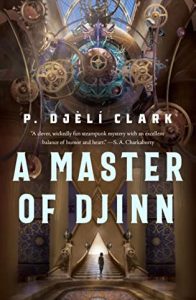 Cruel Winter with You (Under the Mistletoe Collection, #1) by Ali Hazelwood
Cruel Winter with You (Under the Mistletoe Collection, #1) by Ali Hazelwood Narrator: Vivienne LaRue
Format: audiobook, ebook
Source: purchased from Amazon, purchased from Audible
Formats available: ebook, audio
Genres: contemporary romance, holiday romance, short stories
Series: Under the Mistletoe #1
Pages: 73
Length: 2 hours
Published by Amazon Original Stories on November 12, 2024
Purchasing Info: Author's Website, Publisher's Website, Amazon
Goodreads
For two former childhood friends, a blustery winter storm stirs some frosty—and scorching—memories in a delightful short story by #1 New York Times bestselling author Ali Hazelwood.
All newly minted pediatrician Jamie Malek wants is to borrow a roasting pan for Christmas dinner. Unfortunately, that requires her to interact with Marc—her best friend’s troublemaking brother, who’s now a tech billionaire. He’s the one who got away. She’s the one who broke his heart. Outside, a howling blizzard. Inside, a crackling fire. Suddenly, being snowbound with the man she never expected to see again might not be such a bad way to spend a winter’s night.
Ali Hazelwood’s Cruel Winter with You is part of Under the Mistletoe, a stirring collection of December romances that thrill and tingle all the way. They can be read or listened to in one swoony sitting.
My Review:
 I was stuck in traffic at the end of Only Santas in the Building and found myself listening to the teasers for ALL the rest of the stories in the Under the Mistletoe collection and, well, I got hooked. So here we are back with another not too big, not too small, just right little holiday romance to sweeten – and heat up – the season.
I was stuck in traffic at the end of Only Santas in the Building and found myself listening to the teasers for ALL the rest of the stories in the Under the Mistletoe collection and, well, I got hooked. So here we are back with another not too big, not too small, just right little holiday romance to sweeten – and heat up – the season.
This one is the longest entry in the collection, so it has just a bit more time and scope to get into the setup of the story and the backstory of the characters – and do they EVER have backstory. So this one gets just a bit deeper than the others – and it makes for a nice change of pace from the rest.
Jamie and Marc were not childhood sweethearts. Nor did they have a high school romance. Not that Marc didn’t want either of those things to happen. He was just very, very good at not letting Jamie know it.
Which was probably a good thing, as Jamie and his older sister Tabitha were childhood and high school besties. And even when this story takes place – ten whole years after Jamie and Tabitha’s high school graduation – Tabitha still hasn’t gotten past her childhood resentment of her parents’ bringing home their ‘Oops Baby’ just after her third birthday.
But Marc seems to have recognized that Jamie was his person the very first time she held him in her arms, when he was a newborn and she was all of two-and-a-half. In spite of decades of teasing and name-calling and everything that children can do to each other short of outright warfare, Jamie is still his person – a fact that Marc has built his entire life around even as he’s held it so close to his heart that Jamie doesn’t have a clue.
But on this one blustery cold winter night, stuck together at his parents’ otherwise empty house because her self-absorbed father thought nothing of sending her two miles down the road, on foot, in an impending northern Illinois blizzard, to retrieve a copper baking pan from his parents’ kitchen – all the secrets are laid bare.
And finally, at last, so are they.
 Escape Rating B: In a collection of mostly fluff, this story gets surprisingly deep. And sad. And just a bit heartbreaking. It’s told in a series of flashbacks, sandwiched between the events of the now, and those flashbacks are what give the story its depth. But not in the way one expects.
Escape Rating B: In a collection of mostly fluff, this story gets surprisingly deep. And sad. And just a bit heartbreaking. It’s told in a series of flashbacks, sandwiched between the events of the now, and those flashbacks are what give the story its depth. But not in the way one expects.
It’s never been quite the right time for Jamie and Marc. She’s not quite three years older – something that mattered a lot when they were children but doesn’t matter in their late 20s at all. When things have gotten hard between them – not like that – it’s been because Marc’s been keeping the secret of his true feelings for Jamie pretty much all of his life – and occasionally those feelings get impatient.
He’s always been ready, but Jamie hasn’t. Because she’s afraid, not of Marc, not of having Marc, but of losing him. And it’s in the past that we see why. And that’s where the heartbreaking bits come in, because it’s not about him. It’s about her dad. Not in any terrible way, but certainly in a terribly human way.
I have to admit that Marc’s behavior occasionally tip-toed up to the line into the song “Every Breath You Take” in that it seems like he’s always been watching Jamie, always looking at her and after her even if she doesn’t know it, always waiting for the right moment to tell her that he loves her, planning his whole, entire life around making that happen. It seems romantic – but it’s also just a bit squicky and could have easily gone VERY wrong.
 If it had it wouldn’t have fit in this collection at all. But since it didn’t, it did. And it does, in the end, work out. They are both finally in the right place at the right time with all their cards on the table.
If it had it wouldn’t have fit in this collection at all. But since it didn’t, it did. And it does, in the end, work out. They are both finally in the right place at the right time with all their cards on the table.
I’m still enjoying this collection, the audios have ALL been lovely including this story’s voicing by Vivienne LaRue, and it’s all still feeling “just right” for the season. I may finish them ALL before this holiday is done. After all, Hanukkah doesn’t end until January 2, 2025, so I have plenty of time to indulge my holiday spirit!

 Only Santas in the Building (Under the Mistletoe Collection, #5) by
Only Santas in the Building (Under the Mistletoe Collection, #5) by  As compared to
As compared to 
 All by My Elf (Under the Mistletoe Collection, #3) by
All by My Elf (Under the Mistletoe Collection, #3) by  After
After The President's Brain Is Missing by
The President's Brain Is Missing by  It did remind me more than a bit of the author’s
It did remind me more than a bit of the author’s  Chasing New Suns: Collected Stories by
Chasing New Suns: Collected Stories by  “Five Days Until Sunset” (originally published in
“Five Days Until Sunset” (originally published in  New Adventures in Space Opera by
New Adventures in Space Opera by  “Better Living Through Algorithms” by Naomi Kritzer in Clarkesworld Magazine Issue 200, May 2023) by
“Better Living Through Algorithms” by Naomi Kritzer in Clarkesworld Magazine Issue 200, May 2023) by  "The Mausoleum's Children" by Aliette de Bodard in Uncanny Magazine Issue 52, May-June 2023 by
"The Mausoleum's Children" by Aliette de Bodard in Uncanny Magazine Issue 52, May-June 2023 by  I put this particular story towards the front of the list because of the author. I’ve very much enjoyed her
I put this particular story towards the front of the list because of the author. I’ve very much enjoyed her  The obvious bit is wrapped around Thuận Lộc’s need to belong, her guilt about not bringing her peeps out with her, and her attempt to assuage just a piece of that trauma. But there’s also more than a bit about abuse and its victims, Stockholm Syndrome writ very, very large, and the rapaciousness of greed for power in all forms and the way that some people try to escape evil by getting on top of it or allowing themselves to be co-opted by it.
The obvious bit is wrapped around Thuận Lộc’s need to belong, her guilt about not bringing her peeps out with her, and her attempt to assuage just a piece of that trauma. But there’s also more than a bit about abuse and its victims, Stockholm Syndrome writ very, very large, and the rapaciousness of greed for power in all forms and the way that some people try to escape evil by getting on top of it or allowing themselves to be co-opted by it. "One Man's Treasure" by Sarah Pinsker in Uncanny Magazine Issue 50, January-February 2023 by
"One Man's Treasure" by Sarah Pinsker in Uncanny Magazine Issue 50, January-February 2023 by  "How to Raise a Kraken in Your Bathtub" by P. Djèlí Clark in Uncanny Magazine Issue 50, January-February 2023 by
"How to Raise a Kraken in Your Bathtub" by P. Djèlí Clark in Uncanny Magazine Issue 50, January-February 2023 by  As a person with at least a Supporting Membership in this year’s World Science Fiction Convention, I have voting rights for the Hugo Awards. In order to be informed about exercising those rights, the Awards committee compiles a packet of ebook versions of as much of the nominated material as the publishers will give them. That packet became available this week and I immediately downloaded the lot.
As a person with at least a Supporting Membership in this year’s World Science Fiction Convention, I have voting rights for the Hugo Awards. In order to be informed about exercising those rights, the Awards committee compiles a packet of ebook versions of as much of the nominated material as the publishers will give them. That packet became available this week and I immediately downloaded the lot.